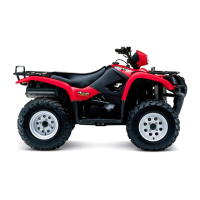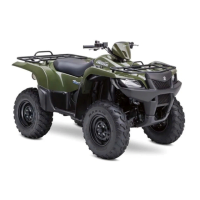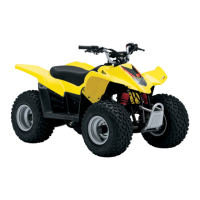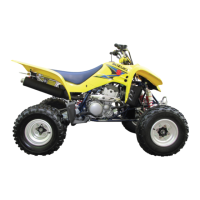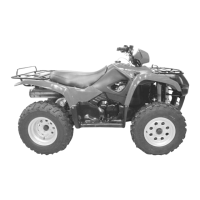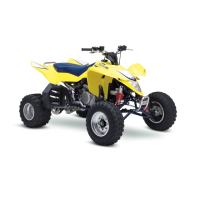5-6 CHASSIS
• Inflate the tire to seat the tire bead.
$ Maximum tire bead seat pressure
Front : 250 kPa (2.5 kgf/cm
2
, 36 psi)
Rear : 250 kPa (2.5 kgf/cm
2
, 36 psi)
#
Place the tire under a protective tire cage or similar pro-
tective covering device before inflating the tire. To mini-
mize the possibilty of tire damage when seating the tire
bead, never exceed the MAXIMUM TIRE BEAD SEAT
PRESSURE rating shown on the tire.
NOTE:
Check the “rim line” 1 cast on the tire side walls. It must be equi-
distant from the wheel rim all the way around. If the distance be-
tween the rim line and the wheel rim varies this indicates that the
bead is not properly seated. If this is so, deflate the tire com-
pletely, and unseat the tire bead on both sides. Then, coat the
bead with clean water, and re-seat the tire.
• Adjust the tire pressure to specification.
$ Cold inflation tire pressure
Front : 20 kPa (0.20 kgf/cm
2
, 2.9 psi)
Rear : 20 kPa (0.20 kgf/cm
2
, 2.9 psi)
$ Vehicle load capacity: 38 kg (84 lbs)
#
Before inflating the tire, chack the MAXIMUM OPERAT-
ING PRESSURE rating of the tire. This is indicated by a
“
” following the tire size shown on the sidewall. The
number of “
”on the tire indicates the maximum oper-
ating pressure.
$ Maximum operating pressure
: 25 kPa (0.25 kgf/cm
2
, 3.6 psi)
: 35 kPa (0.35 kgf/cm
2
, 5.1 psi)
: 45 kPa (0.45 kgf/cm
2
, 6.5 psi)

